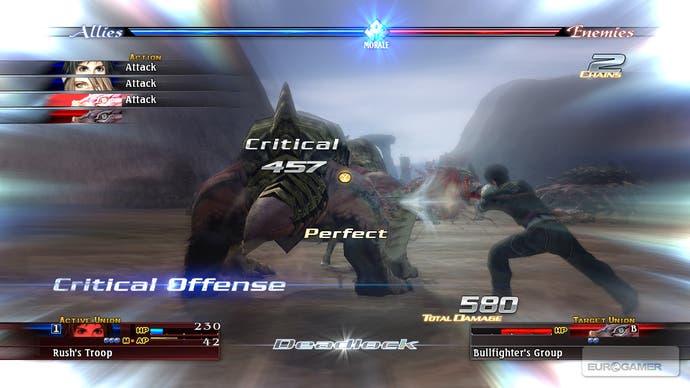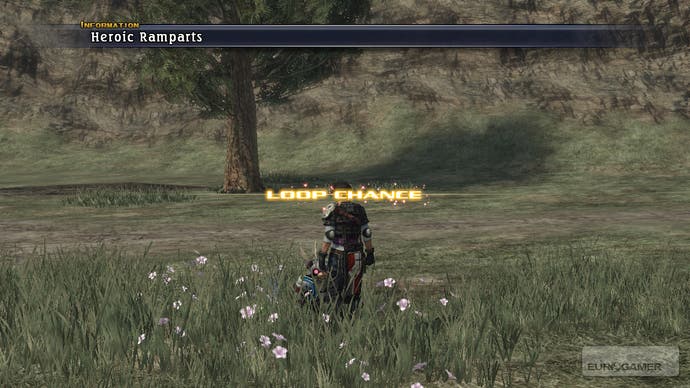The Last Remnant
Dregs on a bit.
The union concept works extremely well, although more fastidious players will take issue with how little control you have over specific actions. For instance, to prevent magic users from getting killed instantly as soon as anything decides to attack them you just place them in a union with stronger units. You have to keep positioning in mind - getting too close to enemy units puts your own union in 'lockdown', meaning that they cannot attack any other union, and you have to be careful not to leave your unions open to attacks from the side or behind through careless commands.
As for equipment, you only have control over main character Rush's kit - every other union leader or character you recruit takes care of things themselves, never troubling you for more than an occasional share of the materials that you win from battles. Rather than levelling up, you strengthen unions through their actions; use a lot of Mystic Arts and they'll become more powerful, attack all the time and their strength will go up, use plenty of healing spells and those will become more effective. Once you get over the perceived lack of control, it's liberating. You're left to think about strategy rather than puzzling over the minutiae of equipment and specific spells in menus.
Although it's worryingly easy to breeze through the early part of the game by spamming Mystic Arts, especially as everyone is automatically fully healed after each fight, the battles get an awful lot harder very quickly. At first this takes you by surprise, and given that the game has no save points, it's important to remember to save before and after important battles to leave room for strategic experimentation. Being able to save anywhere is hugely useful, but the absence of save points contributes to a general lack of structure that characterises the game outside of the main battles.

Here, The Last Remnant is decidedly lacklustre. The pacing is all over the place, and the quest design is awkward. You find yourself splitting your time between the story and random tasks from strangers in town pubs in order to buff your unions in preparation for a dungeon, but there's nothing approaching a quest log; once you've taken up a task, the game forces you to do it, even going so far as to teleport you to the appropriate location.
Several times, we encountered quests that consisted of nothing more than talking to a character for a while, being teleported to the appropriate place, walking a few steps in a particular direction, watching a cut-scene or fighting a battle, and then being teleported back. It breaks the flow and feels artificial. Wandering around towns in general is completely arbitrary - there's nothing organic about the way that the game progresses, and we often found ourselves wishing we could pick quests or acquire equipment through menus, a la Fire Emblem, so that we could spend more time fighting.

The dungeons, too, often go on for far too long, although the absence of random battles does rather alleviate that irritation. Sadly it still feels like a grinding slog a lot of the time, picking your way through easy fights, pointless side-quests and wandering around for a few hours in-between every excellent boss fight or hour of exciting story exposition.
The longer we've spent with The Last Remnant, the more we find ourselves wishing that it were a pure strategy RPG, because the more time you invest, the more interesting the battle system becomes - and, as a consequence, the more you begin to resent everything that prevents you enjoying it. It's a unique and compelling combat system buried beneath choppy pacing, too much wandering around, disappointing presentation problems and an awful lot of loading, and whether that's worth accepting depends largely on your tolerance or affection for long-winded self-indulgence, and whether you think 40 quid is a reasonable amount to pay for one superb idea cushioned by hours of grinding mediocrity.

